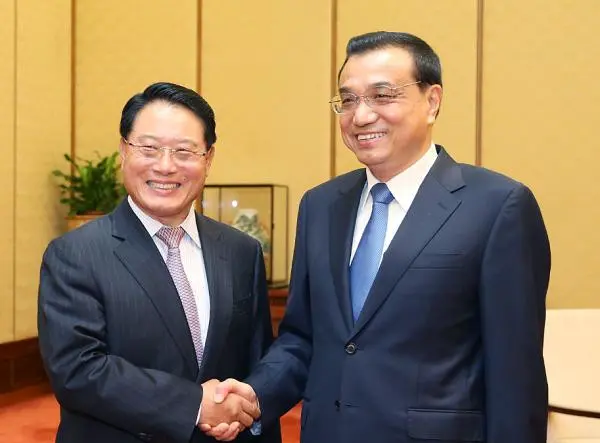Limiting negative impacts the industrialization brings us and protecting the environment, while sustaining economic growth, is one of the biggest challenges of our time, said UNIDO officer Ralf Bredel in an exclusive interview with Asia Pacific Daily.
Chinese Premier Li keqiang meets UNIDO Director General Li Yong on Jun. 9, 2015.
As the Representative of the United Nations Industrial Development Organization (UNIDO) and Head of UNIDO’s Regional Officer for China, the Democratic People’s Republic of Korea and Mongolia, Bredel pointed out, that today we no longer need to choose between industrial development and environmental protection.
“While in the past, industrial development has been often linked to excessive natural resource consumption, pollution and excessive waste,” said Bredel, “both industrial development and environmental protection can go hand in hand if we apply the right solutions by promoting inclusive and sustainable industrial development (ISID).”
UNIDO’s vision the ISID global campaign implies that no one is left behind and all parts of society benefit from industrial progress, which also provides the means for tackling critical social and humanitarian needs.
Bredel introduced that the UNIDO is promoting ISID in the context of sustainable urbanization is through the application of Resource Efficient and Cleaner Production (RECP), which aims at achieving efficient utilization of industrial resources, minimizing waste and preventing pollution at the industrial enterprise level at the first place.
“More recently,” he said, “we have started to up-scale RECP from the micro-level of enterprises to the meso-level with the development of eco-industrial parks (EIPs), where enterprises exchange and reuse waste resources generated by others.”
Bredel suggested that in China, where occurs an estimated 1,600 industrial parks and some of the biggest environmental challenges have been seen, the development of EIPs will contribute to sustainable urban planning and the development of eco-cities.
“Besides environmental benefits, there are tangible economic benefits of such an approach for involved enterprises through economic savings and the creation of new economic opportunities,” he said, “as well as social benefits for society as a whole through improved health outcomes and new job opportunities.”
Tackling with China’s overcapacity
Li Yong, the Director General of UNIDO visits UNIDO Solar Energy Center in Lanzhou, China on Sept. 2, 2014.
In the process of China’s industrial development, the Chinese government fully recognizes the environmental challenges, and faces the dilemma of overcapacity at the same time.
Since overcapacity of production implies not only a waste of capital, but also a huge waste of energy and precious natural resources, the government is taking the issue of overcapacity very serious and is positively dealing it in a constructive way.
Bredel told APD that from the perspective of UNIDO, the current challenges also offer an opportunity. For China, this opportunity is to accomplish a second structural transformation process.
The first transformation was to change the economic structure to an industrial economy, he said, while the second change would be to upgrade the manufacturing industry to make it much more technology- and knowledge- intensive, and to turn China into a green and innovative “world manufacturing power”.
“This would also serve to realize the vision enshrined in the Government’s ‘Made in China 2025’ initiative and help Chinese enterprises move up in global value chains,” he said.
Bredel also reminded people that skill upgrading and investment in R&D would be crucial in the development of these technology-intensive industries and skill-based technological change in China and in the region.
“Otherwise, income inequality may increase,” he said, “because high demand for a limited number of highly skilled people will push their wages up, and declining demand for a large number of low skilled workers will push their wages down.”
China will be able to master the required green transition process under the 13thFive Year Plan and become a global leader in the green industry field and in resource efficient and cleaner production, Bredel believed.
 简体中文
简体中文

